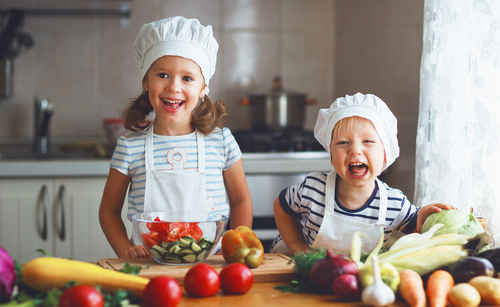
Eating as a Family
Life with a toddler gets very busy, and it can be hard to keep a regular routine for dinner time. Often this means feeding your child first and eating your meal later. It is important, that families spend time together, and family mealtimes are a great way to do that.
You are the most important role model for your child. So, if you want your toddler to eat well, sharing mealtimes is a good idea. They can see you modelling healthy eating, trying new foods, and using good table manners.
Benefits of eating together
There are many benefits of eating together as a family. These include:
-
Allows conversation to help build family relationships.
-
Encourages healthier food choices as children will eat a wider variety of foods by watching others in the family eat.
-
Family meals can be used to role-model behaviour and skills such as learning to use spoons, forks, or knives and learning to take turns talking.
-
Learn more about portion control with homemade meals.
-
Eating home-cooked meals saves money compared to eating out or takeaway.
-
Eating a meal with the family may help you feel less stressed.
How to make family meals enjoyable
To make mealtimes as enjoyable as possible, you can try the following suggestions:
-
Set aside regular times to eat together.
-
Reduce the rush by allowing plenty of time to have a chat and relax during your meal.
-
Get everyone involved, from choosing the menu to helping with preparation. Younger children can wash vegetables, stir foods, toss salads and set the table. Older children might enjoy cooking a meal for the family. Visit cooking with kids for some ideas.
-
Use family meals as a chance to talk. If your child finds it hard to put their day into words, avoid asking yes/no questions. Try questions like ‘what was the favourite part of your day?’
-
Reward good behaviour such as using good table manners and trying new healthy foods with praise. Avoid using food as bribes or punishment.
-
Be creative with mealtimes to create some excitement, for example, healthy pancakes for breakfast, a picnic lunch in the park or backyard, or having special guests over for dinner.
-
Turn off the TV and keep other devices out of reach during mealtimes. This will help reduce any distractions.
-
Keep mealtimes fun and positive. Avoid arguments over food or forcing your child to eat everything on their plate.
Toddlers and food waste
Your toddler may play with their food or leave most of their food uneaten on their plate. This can be stressful for a few reasons; the cost of food, time spent preparing food, and possible concerns that your child isn’t eating enough.
Some suggestions to ease this stress for you and your family include:
-
Minimal time spent on meal preparation for your toddler.
-
Avoid battles with your toddler about food and eating. Leaving food on their plate may be a sign that they have had enough to eat. Toddlers can recognise their own hunger and fullness signals.
-
Offer a variety of small portions on their plate. They may not need as much as you think. Please visit Healthy eating for children for dietary guidelines and portion sizes.
-
Try using special plates for toddlers that are non-breakable to help prevent food from being tipped out.
[Raising Children Network, 2019; Better Health, 2021.]
Related Topics



